Exploring the Benefits and Considerations of Alcohol Fuel Lines for Enhanced Performance and Efficiency
ສ.ຫ. . 14, 2024 10:10 Back to list
Exploring the Benefits and Considerations of Alcohol Fuel Lines for Enhanced Performance and Efficiency
The Importance of Alcohol Fuel Lines in Modern Vehicles
As the world moves towards more sustainable energy solutions, the automotive industry is adapting rapidly to meet new environmental standards and consumer demands. Among the most significant advancements has been the use of alcohol-based fuels, such as ethanol and methanol. While these fuels offer a greener alternative to traditional gasoline, they also necessitate a reevaluation of various components within vehicles, particularly fuel lines. Understanding the role and importance of alcohol fuel lines is essential for both manufacturers and consumers alike.
What Are Alcohol Fuel Lines?
Alcohol fuel lines are specialized tubing designed to transport alcohol-based fuels from the tank to the engine. Unlike conventional fuel lines, which are typically made from rubber or certain plastics, alcohol fuel lines must be constructed from materials that can withstand the unique properties of alcohol-based fuels. Ethanol, for example, is known for its ability to attract moisture, which can lead to corrosion and degradation in standard fuel lines. Methanol, on the other hand, is highly corrosive and can dissolve specific materials if not properly contained.
To combat these issues, manufacturers produce alcohol fuel lines using materials like fluoropolymer, stainless steel, or advanced rubber compounds resistant to alcohol’s chemical properties. These materials ensure the integrity and longevity of the fuel lines while preventing leaks that could lead to performance issues or safety hazards.
Benefits of Alcohol Fuel Lines
1. Enhanced Durability Alcohol fuel lines are designed to withstand the harsh environment created by alcohol fuels. They offer improved resistance to corrosion and can handle varying temperatures and pressures more effectively than traditional fuel lines.
2. Improved Performance When using alcohol-based fuels, proper fuel delivery is crucial for engine performance. Alcohol fuel lines are engineered to maintain efficiency, reducing the risk of fuel vaporization in the lines and ensuring optimal fuel flow to the engine.
alcohol fuel line

3. Environmental Impact By using alcohol-based fuels and the appropriate fuel lines, vehicles contribute to reducing greenhouse gas emissions. Ethanol-blended fuels can lower carbon dioxide emissions, making them a more environmentally friendly choice compared to conventional gasoline.
4. Compatibility with Flex-Fuel Vehicles Many modern vehicles are designed as flex-fuel vehicles (FFVs), capable of running on a mixture of gasoline and alcohol fuels. The incorporation of alcohol fuel lines is essential to ensure these vehicles perform efficiently on varied fuel types, providing the necessary adaptability for consumers.
Challenges and Considerations
Despite their benefits, the switch to alcohol fuel lines is not without challenges. One of the most pressing concerns is the cost associated with manufacturing and replacing these specialized lines. While they offer long-term advantages, initial expenses can deter some consumers and manufacturers.
Furthermore, as the industry continues evolving, consistent standards and regulations are essential to ensure safety and performance. The incorporation of alcohol fuel lines must be accompanied by thorough testing and adherence to guidelines set by automotive regulatory bodies to prevent failures and hazards during operation.
Conclusion
As the demand for cleaner and more sustainable fuel options continues to grow, alcohol fuel lines play an increasingly critical role in the automotive industry. Their design not only facilitates the use of eco-friendly fuels but also ensures that vehicles can perform at their best. With advancements in materials technology and a commitment to environmental responsibility, alcohol fuel lines will remain integral to the evolution of modern transportation. Embracing these innovations is vital to promoting sustainability while meeting consumer needs in a rapidly changing market.
